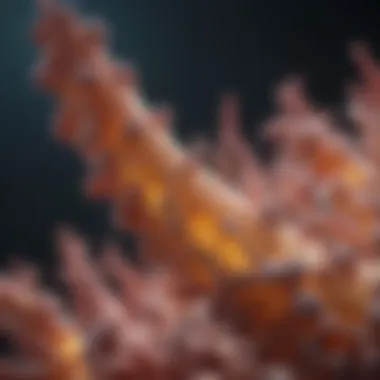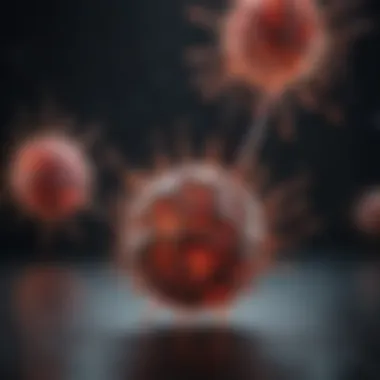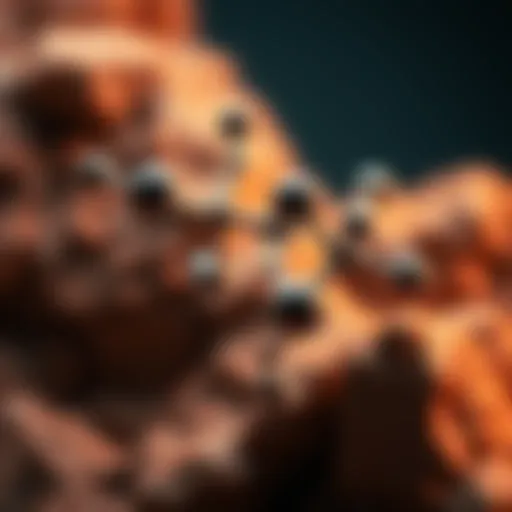Ucht1 Antibody: Insights into Structure and Function


Intro
The Ucht1 antibody, a notable component in immunology, plays a significant role in T-cell regulation and immune responses. Understanding this antibody's structure and functionality is vital for advancing both research and clinical practices. This section provides an overview of the key findings, contextualizing the importance of Ucht1 within the broader field of immunology and antibody research.
Research Overview
Summary of Key Findings
The analysis of Ucht1 antibody reveals several critical insights:
- Structural Characteristics: The Ucht1 antibody has a unique structure that enhances its ability to interact with specific T-cell receptors.
- Role in T-Cell Regulation: This antibody is essential for modulating the activity of T-cells, thus influencing various immune responses.
- Therapeutic Potential: There is significant interest in its use for therapeutic purposes, particularly in the management of immunological diseases and conditions.
The Ucht1 antibody represents a focal point in improving immunotherapy and diagnostics.
These findings underscore the necessity for further exploration into its functionalities and implications.
Background and Context
Ucht1 is an antibody that was first identified in research focused on T-cell antigens. As immunologists have delved deeper into T-cell functions, the relevance of Ucht1 has become increasingly apparent. This antibody specifically binds to CD4 positive T-cells, playing a crucial role in regulating their activity. It serves not just as a marker for T-cell activation but also influences the broader immunological landscape, making Ucht1 a focal point for both basic and applied research. The implications of this research extend into therapeutic realms, where Ucht1 could potentially aid in developing more effective treatments for autoimmune diseases and other related conditions.
Methodology
Experimental Design
Research involving Ucht1 often employs a range of experimental techniques. These can include:
- In Vitro Studies: Isolating T-cells and observing their responses in the presence of Ucht1 antibodies.
- Animal Models: Utilizing models to understand the broader implications of Ucht1 in a live system.
- Clinical Trials: Testing therapeutic applications in human subjects.
Data Collection Techniques
To gather data, researchers often apply various collection methodologies such as:
- Flow Cytometry: Allows for analyzing the binding of Ucht1 to T-cell receptor sites.
- Western Blotting: This technique helps to determine the levels of Ucht1 in different biological samples.
- Immunohistochemistry: Used to visualize the distribution of Ucht1 in tissues.
Through these methods, scientists can draw conclusions and continue to refine their understanding of this vital antibody and its potential applications.
Prolusion to Ucht1 Antibody
Understanding the Ucht1 antibody is essential in the field of immunology. This antibody plays a vital role in T-cell regulation and has several clinical applications. Its importance stretches beyond basic research, extending into therapeutic uses and diagnostics. By dissecting the Ucht1 antibody's structure and functions, this article presents a comprehensive guide to its significance in the immune system and clinical practice.
Overview of Antibodies
Antibodies are integral proteins produced by the immune system. They help identify and neutralize foreign objects like bacteria and viruses. Structurally, antibodies can be classified into various types, each serving a unique function. The basic structure includes heavy and light chains, forming a Y-shaped molecule. The tips of the Y bind to specific antigens, allowing the immune system to recognize threats.
Antibodies undergo a process called affinity maturation. This involves mutations in the antibody genes following exposure to an antigen, improving the binding strength. The importance of antibodies cannot be overstated. They are fundamental in defending the body against pathogens and play a key role in vaccine development.
Defining Ucht1
Ucht1 is a particular type of antibody that has drawn significant attention over recent years. This antibody targets the CD3 complex of T cells. By binding to this complex, Ucht1 can modulate T-cell responses. This mechanism can enhance or suppress immune activity, making Ucht1 valuable in various therapeutic contexts, especially in autoimmunity and transplantation.


The precise mechanisms behind Ucht1's function remain a topic of ongoing research. Its ability to regulate T-cell responses shows promise in therapeutic applications where modulation of the immune response is necessary. Understanding Ucht1 provides further insight into the complex realm of immunological responses.
Biochemistry of Ucht1 Antibody
Understanding the biochemistry of Ucht1 antibody is crucial for comprehending its function within the immune system. This section highlights the antibody's structural attributes and its mechanisms of action, which are integral for both research and therapeutic strategies in immunology. The insights provided here will assist researchers and professionals in navigating the complexities of this antibody regarding its biochemical nature, implications in immune regulation, and potential in clinical applications.
Structural Characteristics
The structural characteristics of Ucht1 antibody are essential for its function. Ucht1 is a member of the IgG class of antibodies, characterized by its Y-shaped structure, which consists of two heavy chains and two light chains. This configuration allows for the formation of specific antigen-binding sites.
Notably, the variable region of Ucht1 provides it with the capability to bind to specific T-cell receptors. The unique amino acid sequences in this region contribute to the specificity of Ucht1, allowing it to target and modulate the activity of T-cells effectively.
Moreover, the structural stability of Ucht1 is influenced by various interactions, such as hydrogen bonds and hydrophobic forces, that maintain its conformation. This stability is crucial, as it ensures that the antibody can withstand the physiological environment of the body while performing its immune functions.
Additionally, the glycosylation of Ucht1 impacts its effectiveness. Glycans attached to the antibody structure can affect its binding affinity and overall biological activity. Understanding these structural elements not only clarifies how Ucht1 functions but also guides the design of antibody-based therapies in clinical settings.
Mechanism of Action
The mechanism of action of Ucht1 antibody involves a series of interactions with T-cells that regulate immune responses. Primarily, Ucht1 recognizes specific markers present on T-cells, facilitating communication between immune cells and modulating their responses.
Once Ucht1 binds to the target T-cell, it triggers a cascade of intracellular signals. These signals can promote T-cell activation or, in some cases, inhibit immune responses. This dual ability plays a vital role in maintaining homeostasis within the immune system and preventing overactive responses that can lead to autoimmunity.
Ucht1 has also been found to engage in antibody-dependent cell-mediated cytotoxicity (ADCC). In this process, it recruits other immune cells to destroy infected or cancerous cells. This highlights Ucht1’s relevance not only in regulating immune responses but also in therapeutic contexts, where it could be utilized to enhance the body's ability to eliminate malignancies.
Ucht1's modulation of T-cell functions underscores its potential for therapeutic applications in both cancer immunotherapy and autoimmune diseases.
The complexity of Ucht1's interaction with T-cells illustrates that understanding this antibody deeply affects research directions and clinical strategies. As more discoveries arise regarding Ucht1's mechanisms, the application of this knowledge could transform treatment approaches in various immunological disorders.
Role in Immune Response
The role of Ucht1 antibody in immune response is vital in understanding how this specific antibody functions in the human body. Ucht1 antibody plays a critical role in regulating T-cell activity, particularly concerning its effects on the immune system. T-cells are essential components of adaptive immunity and their regulation is crucial for maintaining immune homeostasis. Disruption in T-cell regulation can lead to various health problems, including autoimmune diseases. Therefore, examining how Ucht1 influences T-cell function enables researchers to comprehend broader immunological responses and develop targeted therapies.
Ucht1 and T-cell Regulation
Ucht1 antibody primarily interacts with the CD3 complex on T-cells, leading to modulation of T-cell activation. This interaction is significant because it influences T-cell proliferation and cytokine production. Cytokines are signaling molecules that facilitate communication between cells in the immune system. When Ucht1 binds to T-cells, it can either enhance or inhibit their activity depending on the context of the immune response.
The balance between activation and inhibition dictated by Ucht1 is essential. Enhanced T-cell activity can contribute to effective immune responses against infections and tumors. However, excessive activation can result in tissue damage and autoimmunity.
Some studies have indicated that Ucht1 may serve as a checkpoint, regulating the immune system’s response. Checkpoints are natural mechanisms that prevent overactive immune responses. This property presents Ucht1 as a potential target for immunotherapies that enhance T-cell function in cancer treatment.
Key Insights on Ucht1 T-Cell Interaction:
- Ucht1 antibody binds to CD3 complex.
- Interaction modulates T-cell activation.
- Can enhance cytokine production under specific conditions.
- Regulates balance between T-cell activation and inhibition.
Implications in Autoimmunity
The implications of Ucht1 in autoimmunity are profound. Autoimmune diseases arise when the immune system mistakenly targets healthy cells. Research shows that dysregulation of T-cells often contributes to the development of autoimmune conditions. This is where Ucht1's function becomes particularly critical.
In autoimmune disorders, there may be an overactive response of T-cells which escalates immune reactions against the body’s own tissues. Ucht1 antibody can inhibit these improperly activated T-cells, potentially leading to therapeutic strategies that can restore balance without compromising overall immunity.
Some autoimmune diseases where Ucht1's role is being studied include Multiple Sclerosis and Rheumatoid Arthritis. Understanding how this antibody can be utilized to modulate T-cell activity may offer new avenues for treatment. Researchers are exploring the effect of Ucht1 on T-cell regulation to mitigate the effects of autoimmune responses, promoting tolerance and preventing tissue damage.


Conclusion of Immune Response Role: The research on Ucht1 antibody gives insights into its role in T-cell regulation. This understanding is critical for developing potential treatments for autoimmune diseases. By targeting Ucht1, scientists may uncover ways to better manage conditions where the immune system fails to distinguish between foreign and self-antigens.
Clinical Applications of Ucht1 Antibody
In recent years, the Ucht1 antibody has garnered significant attention in both research and clinical settings. Understanding its clinical applications is crucial for advancing therapeutic approaches and improving diagnostic techniques in immunology. The Ucht1 antibody plays an important role in T-cell modulation and has implications for treating various conditions, particularly autoimmune diseases and cancers. Its unique properties allow it to be a valuable tool in addressing immune-related disorders.
Therapeutic Uses
The therapeutic potential of the Ucht1 antibody is noteworthy. It primarily works by targeting specific T-cells, particularly those involved in cellular immunity. This function makes it especially relevant in developing treatments for autoimmune conditions such as multiple sclerosis and rheumatoid arthritis, where T-cell activity contributes to tissue damage.
The application of Ucht1 antibody has also been studied in cancer immunotherapy. By enhancing T-cell responses, it can strengthen the immune system’s ability to recognize and eliminate tumor cells. Various preclinical studies provide promising data indicating that the Ucht1 antibody may augment existing treatment protocols, improving patient outcomes.
However, while the benefits are clear, several considerations must be addressed in therapeutic contexts:
- Patient Selection: It is crucial to identify which patients are most likely to benefit from treatments involving Ucht1.
- Dosage and Administration: The effective and safe dosage should be established through rigorous clinical trials.
- Potential Side Effects: Monitoring adverse reactions, including cytokine release syndrome, is vital for ensuring patient safety.
Diagnostic Potential
In addition to therapeutic uses, Ucht1 antibody holds substantial promise in diagnostic applications. It serves as a biomarker for particular immune responses, offering insights into the status of T-cell populations in patients. This biomarker role can be particularly useful in evaluating disease progression or therapeutic response in autoimmune diseases.
Using Ucht1 antibody in diagnostics can lead to more personalized treatment plans based on individual T-cell activity levels. Key areas where diagnostic applications are significant include:
- Autoimmune Disease Monitoring: Tracking T-cell activity can help assess disease activity and response to treatment.
- Predicting Treatment Outcomes: Understanding T-cell dynamics may inform prognosis and tailor therapies.
- Research on Immune Function: The Ucht1 antibody can aid in elucidating broader aspects of the immune system and its functioning.
In summary, the clinical applications of Ucht1 antibody are diverse and promising. As researchers continue to explore its potential therapeutic and diagnostic roles, the implications for patient care and understanding of immune responses will expand. Further studies are necessary to fully realize these applications and address existing challenges.
Research Advances Involving Ucht1
The exploration of Ucht1 antibody is vital in the broader field of immunology. Recent research efforts have illuminated various aspects of this antibody, leading to significant discoveries that enhance our understanding of immune responses. Such advances promise not only to deepen scientific knowledge but also to pave the way for innovative therapies and interventions in immune-related disorders.
Current Studies
Current research surrounding the Ucht1 antibody is diverse, focusing on its role in various biological contexts. Key areas of study include its implications in cancer immunotherapy and autoimmune diseases.
- Cancer Immunotherapy: Several studies investigate how Ucht1 can be utilized to enhance T-cell activity against tumors. For example, researchers at Yale University have designed experiments to assess how Ucht1 can improve the efficacy of existing therapies by targeting specific immune pathways.
- Autoimmune Disorders: Investigations are also targeting the role of Ucht1 in conditions like multiple sclerosis and rheumatoid arthritis. Scientists are looking at how Ucht1 interacts with regulatory T-cells, aiming to uncover its potential to modulate immune response and reduce inflammatory pathways.
- Vaccine Development: Current studies include assessing the efficacy of Ucht1 in vaccine contexts. Researchers are exploring how Ucht1 can enhance antigen presentation and improve vaccine effectiveness, particularly for infectious diseases.
Such studies underscore the versatility and potential of Ucht1 in several ongoing clinical advancements.
Key Findings
The results from recent studies reveal important insights into the functionality and application of Ucht1.
- Enhanced T-cell Activation: A significant finding indicated that stimulating Ucht1 expression can lead to increased activation of CD4+ T-cells, which are crucial in orchestrating immune responses. This information could lead to new strategies for immunotherapy, especially in cancer management.
- Regulation of Peripheral Tolerance: Research has shown that Ucht1 is critical in maintaining immune tolerance. By modulating tolerance mechanisms, Ucht1 presents a potential therapeutical approach to manage autoimmune conditions more effectively.
- Safety Profiles: Studies also emphasize the importance of understanding the safety and efficacy of Ucht1 derivatives in clinical settings. In several trials, Ucht1 has shown a favorable safety profile, making it a candidate for further therapeutic development.
"The ongoing exploration of Ucht1 antibody vastly enhances our understanding of the immune system and opens new avenues for treatment strategies."
Challenges in Ucht1 Research
Research on Ucht1 antibodies encounters a myriad of challenges that can impede progress and results. Understanding these challenges is vital for researchers and clinicians who aim to harness the full potential of Ucht1 in immunological studies and therapeutic applications. Addressing these obstacles not only enables better research methodologies but also paves the way for impactful clinical uses of Ucht1 antibodies. This section delves into both the technical limitations and ethical considerations that pose hurdles in Ucht1 research.
Technical Limitations


Technical limitations in Ucht1 antibody research primarily arise from the complexities in studying their behavior and interactions in biological systems. One significant limitation lies in the production and purification processes of Ucht1 antibodies. Inconsistent yields and variations in quality can result from the cell lines used for producing these antibodies. Difficulties in expressing these in sufficient quantities for experiments can lead to delays in research timelines.
Another critical issue is the specificity and cross-reactivity of Ucht1 antibodies. Evaluating their binding affinity is essential, but determining this in vivo often presents challenges. In heterogeneous tissues, distinguishing true binding from nonspecific interactions can complicate interpretation of results. Validating findings across different models and systems further strains resources and time.
"High specificity and production yield are essential for meaningful immunological responses."
Methodological inconsistencies can also pose problems. Techniques like flow cytometry and ELISA require precise calibration and protocols, which if not robust, can profoundly influence the results gathered. Variability in sample preparation and handling can lead to inconclusive data or misrepresentation of Ucht1 antibody capabilities.
Lastly, the growing interest in Ucht1 research has outpaced the development of comprehensive guidelines or standards to unify approaches taken by various laboratories. This situation can lead to fragmented data that lack reproducibility.
Ethical Considerations
The ethical landscape concerning Ucht1 research cannot be overlooked. As in any immunological study, researchers must navigate a complex array of ethical dilemmas. One primary concern is the use of animal models. Ensuring humane treatment in the development and testing phases is crucial. Researchers face scrutiny regarding their methodologies in animal research, including justification for the number of animals used and mitigating pain or distress.
Additionally, there are implications for human studies. Investigating Ucht1 antibodies for therapeutic use necessitates a high level of transparency regarding potential risks and benefits to participants. Guidelines must be adhered to, ensuring informed consent is truly informed and voluntary. Ethical challenges can arise when weighing the benefits of findings against the possible adverse effects on participants.
Moreover, the commercialization of research findings introduces ethical considerations around patenting and intellectual property. The implications of monopolizing access to critical research can stifle collaboration and delay advancements in treatment options for patients.
Research into Ucht1 antibodies, while promising, requires careful navigation of both technical and ethical challenges. Addressing these issues will enhance the robustness of findings and their application in clinical practice.
Future Directions in Ucht1 Research
Understanding the future directions in Ucht1 antibody research holds paramount importance for advancing both basic and applied sciences in immunology. As new technologies develop, there exists an opportunity to deepen insights not merely into Ucht1 function but also its broader implications in medical science. This section aims to identify specific avenues for potential discoveries and the role of collaborative initiatives in this area.
Potential Discoveries
Future investigations into Ucht1 antibodies may uncover new therapeutic applications. The ongoing research aims to elucidate how Ucht1 can be applied in specific conditions like autoimmune diseases or cancers. Given the pivotal role of T-cells in immune regulation, Ucht1 may be pivotal in enhancing immunotherapeutic strategies. Possible future applications could include:
- Targeted treatments for T-cell related disorders.
- Enhanced diagnostic tools, allowing for early detection of immune dysfunction.
- Innovative vaccine strategies that leverage Ucht1's action.
Furthermore, understanding the structural biology of Ucht1 could lead to the design of high-affinity variants, with improved efficacy in binding targets. Such advancements can contribute significantly to personalized medicine, tailoring therapies based on a patient's specific immune profile.
Collaborative Efforts
Collaboration is crucial for the advancement of Ucht1 research. A multidisciplinary approach brings together immunologists, biochemists, and clinical researchers to foster innovation. Relevant efforts may include:
- Interdisciplinary partnerships between academic institutions and biotechnology companies.
- International collaborations to standardize research methodologies and share findings across borders.
- Public-private partnerships aimed at translating discoveries into clinical applications.
Collectively, these collaborative efforts can leverage resources efficiently, enabling larger studies that increase statistical power. By working together, researchers can address complex questions surrounding Ucht1 and its implications comprehensively.
Scientific discovery thrives in collaborative environments, enabling the synthesis of diverse expertise into meaningful advancements.
Focusing on these future directions can potentially revolutionize our understanding of Ucht1 antibodies, leading to significant breakthroughs in immunological research and therapeutic applications.
Finale
The examination of Ucht1 antibody encapsulates a significant frontier in immunology. This article underscores the multifaceted nature of Ucht1, examining not only its biochemical characteristics but also its crucial roles in immune response and potential clinical applications.
Summary of Insights
The insights drawn from the analysis of Ucht1 antibody are extensive. Firstly, its structural properties reveal critical aspects about how it interacts with T-cells, significantly impacting regulatory functions within the immune system. The potential therapeutic and diagnostic uses highlight how Ucht1 can serve as both a treatment modality and a biomarker, thereby enhancing clinical practices. Moreover, ongoing research activities and findings indicate potential breakthroughs in understanding autoimmune disorders, further solidifying Ucht1's relevance in modern medicine.
"The implications of Ucht1 in therapeutic applications may change the paradigm of treatment for several immunological conditions."
Final Thoughts
In summary, the Ucht1 antibody illustrates a compelling case for continued research and application in both academic and clinical settings. The prospects for innovative therapies and enhanced diagnostic tools based on Ucht1 pave the way for future undertakings in immunological research. Careful exploration of its challenges and emerging findings is essential. This area of study not only benefits researchers and educators but also deeply impacts patient care and outcomes in various healthcare landscapes.







